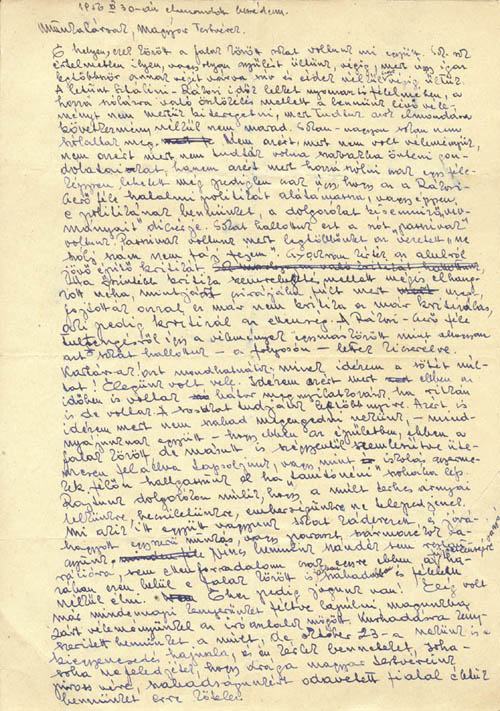Dear colleagues, dear Hungarian brothers!
In this place, between these walls, we spent time together a lot. We sat through many or so meaningless gatherings, because it is true that most of the time we were just waiting for it to end, without heart and interest. In the soul-killing fear of the Stalin-Rákosi times, in addition to encouraging (or inciting) criticism, we did not dare to express our opinion, because we knew it would not go unpunished. Many, very many did not speak their minds. Not because they did not have an opinion, not because they could not put their thoughts into words; because criticism had only one (positive) way, namely by supporting the Rákosi-Gerő policy of power, or praising the “achievements” of these very policies we, the working class, being annihilated by. We heard a lot about we being “passive”. That’s because the guiding principle was “shut up to not to be punished”. Of course, constructive criticism from below was often asked for. If a more sincere critique, though blasphemous, was uttered sometimes, it was immediately drowned, strangled because, as they said, it was no longer criticism but rather agitation, and the agitator is synonymous with the enemy.
Thus, and this is a well-known facts, opinions about the Rákosi-Gerő abuse were exchanged in the corridors, between friendly ears only.
Comrades! You could say, why you summon the ghost of a dark time past? We had enough of it. I summon it because, even in these times there were bold remarks, if rarely. And of course you know the ultimate fate of these, too. I also summon it because we (all of us, together) must not allow ourselves to do the rhythmic applaud expected from us, while keeping our heads down like schoolchildren on the arrival of their “teacher”; not in this building, not between these walls, not anywhere!
It is up to us workers to ensure that these heavy shadows of the past do not crush our souls, our honor, our humanity. We who are here together, and labeled “káders” for so long, are born of simple laborers and peasants. We have no intention of either restoration or counter-revolution, only to live better, freer and without fear in this country (and even more so between these walls) that is increasingly seeking independence. This is our right!
It was enough to hide behind our desks, fearing for our daily crumbs of bread, with opinions sealed deep inside.
This past has forced a tightly shut mouth on us, but the 23rd of October 23 is the dawn of unbending for us too; and I ask you to never, ever forget that the red blood of our dear Hungarian brothers and sisters, our young lives thrown for our freedom, obliges us to do so.
I don’t want to push it as you may very well remember the false words thrown at us by the past; all of which now belong to the graveyard of the ever-erasing time.
October 23, our new March 15, is not for the history books of our freedom-coveting, independence-seeking people, but our reality, right here, right now; and, dear colleagues, we (and all the millions of Hungarians) should not let it die, be it between or outside these walls; because if we all yearn the same then dread, spinelessness and oppressed voices will never return. Let these ideas of October 23 stay with us, live by them, and act on them, forever.
Imre Égerházi





